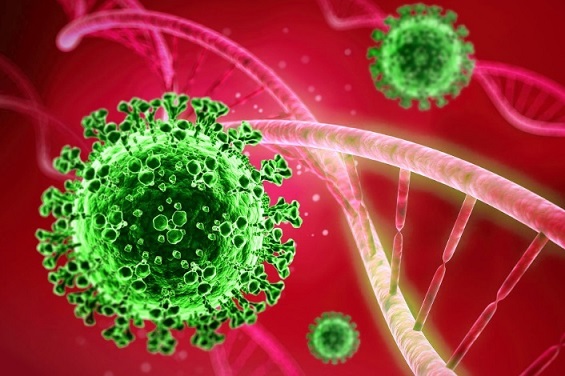Nikhil Prasad Fact checked by:Thailand Medical News Team Jun 28, 2025 7 months, 2 weeks, 2 days, 3 hours, 8 minutes ago
Thailand Medical News: In a groundbreaking new study from Japan, scientists have uncovered how persistent SARS-CoV-2 infections evolve inside the human body, allowing the virus to continue hiding from the immune system for weeks—and possibly months—by mutating specific regions like the Orf1ab gene and spike protein. These prolonged infections could serve as silent incubators for new, more evasive variants of COVID-19.
 Orf1ab Mutations Help SARS-CoV-2 Evade Immunity and Persist in the Body
Orf1ab Mutations Help SARS-CoV-2 Evade Immunity and Persist in the Body
This
Thailand Medical News report is based on research conducted by a team from Tottori University’s Faculty of Medicine in Japan. The research involved scientists from its Division of Infectious Diseases, Division of Virology, Department of Pathobiological Science and Technology, and Department of Respiratory Medicine and Rheumatology. They studied four hospitalized patients with prolonged infections ranging from 37 to 58 days, all of whom had comorbidities like cancer, autoimmune diseases, or pregnancy.
Unusual Virus Behavior and Higher Infectivity at the Start
The researchers collected 55 nasopharyngeal samples and selected 19 that were suitable for detailed testing. These samples were categorized into early-phase and late-phase infections. When the samples were cultured in VERO-E6/TMPRSS2 cells, they noticed that in the early stages, the virus had much higher infectivity (meaning it could more easily infect cells), as shown by lower TCID50 values. But over time, even though the virus kept replicating at stable levels, its infectivity dropped significantly.
This contradicts the idea that the virus always weakens over time. Instead, it appears to change its behavior to become stealthier rather than simply less potent.
Inflammatory Genes Fire Up Then Quiet Down
The study went further by looking at how host cells responded to infection. In the early phase, human immune-related genes like IL6, TNF, and IL1B were strongly activated—this is the immune system’s way of attacking the invader. Other genes like JUN, IL15, and CXCL10 were also elevated, showing a highly inflammatory response.
But as the infection persisted, the immune response changed. The same genes became less active, signaling immune exhaustion or suppression. This immune “silencing” might give the virus the upper hand, allowing it to persist unnoticed.
Orf1ab and Spike Mutations Aid Viral Survival
By sequencing the virus from each patient, the team discovered that significant mutations had accumulated over time—especially in the Orf1ab and spike (S) protein regions. These are critical for viral replication and cell entry. Thirteen single-nucleotide polymorphisms (SNPs) and one deletion were found in the Orf1ab region alone. The spike gene had five SNPs and one deletion.
Even without antiviral drugs like remdesivir or molnupiravir in some patients, the virus still evolved. This implies that natural immune p
ressure alone can drive viral mutations and adaptation inside the body.
Human Airway Cells Confirm Viral Suppression of Immunity
To validate these findings, researchers infected Calu-3 human airway cells and studied how gene expression changed over time. They found that inflammatory genes like IL6 and TNF remained elevated, while ACE2 and TMPRSS2—the key receptors SARS-CoV-2 uses to enter cells—decreased over time. This might suggest a self-regulating viral mechanism to avoid detection while continuing to exist within the host.
Viral Evolution Happening Inside You
This study shows that persistent SARS-CoV-2 infection isn’t just a passive process where the virus sticks around. It actively evolves, alters its infectivity, and changes how it interacts with the immune system. Even more concerning, this evolution can happen without any antiviral drugs involved, driven purely by internal pressures from the immune system.
These prolonged infections may act as hidden breeding grounds for future variants that can evade vaccines and natural immunity, especially in people with compromised immune systems. As a result, constant monitoring of such infections is critical to avoid the emergence of dangerous new strains.
The findings from this study also suggest that persistent infections could play a role in long COVID and other post-infection complications, since the body remains locked in a state of immune dysfunction and inflammation.
Conclusion
Persistent SARS-CoV-2 infections offer a unique window into how the virus adapts within the human host. This Japanese study reveals that Orf1ab mutations and changes in spike protein structure are not random but strategic, helping the virus reduce its visibility to the immune system while maintaining replication. These findings underscore the importance of tracking persistent infections, especially in vulnerable patients, as they could act as launchpads for more elusive and long-lasting forms of COVID-19. Targeting these viral adaptations may be the key to controlling chronic infections and preventing future outbreaks of mutated variants.
The study findings were published in the peer reviewed International Journal of Molecular Sciences.
https://www.mdpi.com/1422-0067/26/13/6221
For the latest COVID-19 News, keep on logging to
Thailand Medical News.
Read Also:
https://www.thailandmedical.news/news/sars-cov-2-triggers-methylation-shifts-in-long-non-coding-rna-to-suppress-immunity-and-promote-viral-persistence
https://www.thailandmedical.news/news/tmn-exclusive-can-lysine-possibly-prevent-sars-cov-2-persistence-and-also-help-those-with-long-covid-and-the-vaccinated
https://www.thailandmedical.news/news/spike-protein-diversity-enables-sars-cov-2-to-evade-full-neutralization-paving-the-way-for-viral-persistence
